6 Famous Zanzibari
Tippu Tip
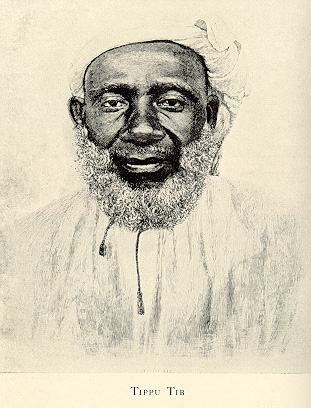 Much
maligned in the "explorer press" this stalwart Zanzibari Adventurer
whose real name was Hamed
bin Mohammedel Marjebi, is better likened to a sort of Dave Crocket or
Francis Drake of East Africa than with the villainous schoolboy-character
popularized as constantly clashing with the western religious explorers of his
time. He served his Sultan(s) for more than 50 years, carrying their flag and
their civilization to it's furthest geographical boundaries.
Much
maligned in the "explorer press" this stalwart Zanzibari Adventurer
whose real name was Hamed
bin Mohammedel Marjebi, is better likened to a sort of Dave Crocket or
Francis Drake of East Africa than with the villainous schoolboy-character
popularized as constantly clashing with the western religious explorers of his
time. He served his Sultan(s) for more than 50 years, carrying their flag and
their civilization to it's furthest geographical boundaries.
Known best as an Ivory
Siti binti Sadi
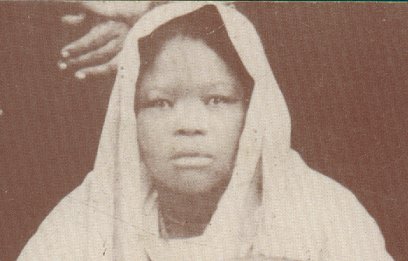 As
the first and greatest Taarab Recording-Star from the early days of phonographic
records She popularized Taarab music through works combing her musical
excellence with love songs containing themes of social empowerment and political
commentary. What made her work so revolutionary was that she sang in the
language of the common people. A long time resident of the Ng'ambo section of
Zanzibar City, she later traveled throughout East Africa performing and selling
thousands of records. So popular among the masses was this new recorded music,
from one of their own in their own language, that some scholars attribute much
of modern spread and regional domination of the Swahili Language to these early
recordings.
As
the first and greatest Taarab Recording-Star from the early days of phonographic
records She popularized Taarab music through works combing her musical
excellence with love songs containing themes of social empowerment and political
commentary. What made her work so revolutionary was that she sang in the
language of the common people. A long time resident of the Ng'ambo section of
Zanzibar City, she later traveled throughout East Africa performing and selling
thousands of records. So popular among the masses was this new recorded music,
from one of their own in their own language, that some scholars attribute much
of modern spread and regional domination of the Swahili Language to these early
recordings.
As a daughter of slaves she started life with
very little. Through her own hard work and her wonderful voice she first
mastered the singing of courtly Tarabu; songs of the palace, in praise of
the Ruler, and sung in Arabic. She then translated those rhythmic and poetic
structures onto popular tunes. The result, Swahili Taarab, made her a Star and
created an new art form, that is still very popular in the Islands and
practically indispensable at Zanzibari weddings and festivals.
Barghash bin Said
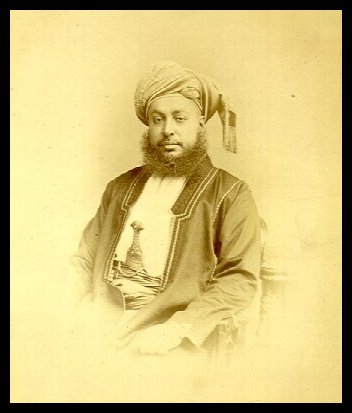 The
third Sultan of Zanzibar, he ruled from 1870 until 1888. His mother was a slave
(who was freed upon his birth; manyZanzibar Sultans were sons of slave
women). His father was the settler king and first Sultan of Zanzibar, Seyyid
Said (Said bin Sultan). Barghash is credited with building much of the
infrastructure of Stone Town, including piped water, public baths, a police
force, roads, parks, hospitals and large administrative buildings such as the
House of Wonders.
The
third Sultan of Zanzibar, he ruled from 1870 until 1888. His mother was a slave
(who was freed upon his birth; manyZanzibar Sultans were sons of slave
women). His father was the settler king and first Sultan of Zanzibar, Seyyid
Said (Said bin Sultan). Barghash is credited with building much of the
infrastructure of Stone Town, including piped water, public baths, a police
force, roads, parks, hospitals and large administrative buildings such as the
House of Wonders.
He was perhaps the last Sultan to maintain a
measure of true independence from European control. He did consult with
European "advisors" who had immense influence but he was still the
central figure they wrestled to control. He crossed wits with diplomats from
Britain, America, Germany, France and Portugal and was often able to play one
country off another in a skillful endgame of pre-colonial chess. It was his son,
Khaled, who while vying for the succession, was the looser in the Shortest War.
Sheikh Abdulla Saleh Farsy
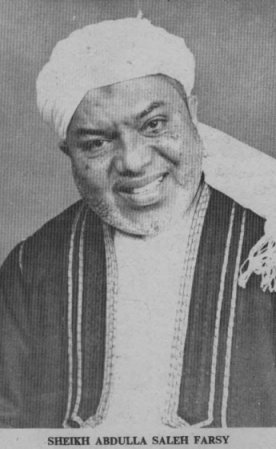
A 20th Century example of a very long line of Islamic Scholars from Zanzibar. His most famous contribution to Islam was the publication of his 807-page QUR'AN TAKATIFU (Glorious Qur'an),
Sheikh Abdullahwas appointed the Inspector General of primary schools on Zanzibar and Pemba in 1949, the Headmaster of the Arabic medium School in 1957 and the Chief Kadhi of Zanzibar in 1960. He left the Isles after the revolution of 1964 and died in Oman on November 9, 1982.
Taria Topan
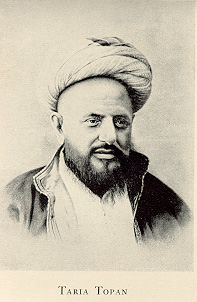 A merchant 'prince' of the old school, he
made millions on the clove trade and millions more while serving as the
collector of Custom Duties at the ports of Zanzibar and Pemba. In that role he
would pay the Sultan a large, but fixed, fee at the start of each year for the
privilege of being appointed as tax collector.
A merchant 'prince' of the old school, he
made millions on the clove trade and millions more while serving as the
collector of Custom Duties at the ports of Zanzibar and Pemba. In that role he
would pay the Sultan a large, but fixed, fee at the start of each year for the
privilege of being appointed as tax collector.
He calculated that he might collect much more
than he had paid out if business was good. At that time in Zanzibar business was
very good. The price of cloves and other spices was strong, demand was high and
the manufactured goods these raw materials were traded for seemed to decrease in
price every year as assembly line production techniques became common in the
West.
With his fortune made he became a city
benefactor. He endowed and built the large ornate medical Dispensary that still
stands near the north end of Stone Town Harbor. He also donated land for "Wakfs",
substantial tracks of land set aside for the benefit of the aged and infirm.
Captain "Zanzibar" Smith
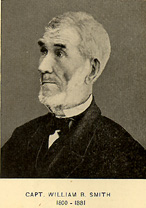
The Americans traded cotton cloth, ("Americani")
for ivory, spices and gum Copal, which was used to make varnish in the factories
of New England. The American trade helped establish Zanzibar as the commercial
capital of the Region. By the 1830's, in one 18 month period, a total of 32
American vessels called at the Zanzibar harbor. In 1836 the amount of commerce
between the two countries warranted the assignment of a permanent American
Consul, in residence in Stone Town. Capt. William Smith sailed 'round the horn'on
so many long voyages between America and the Islands that he became referred to
as Zanzibar Smith on both sides of the equator.


























































